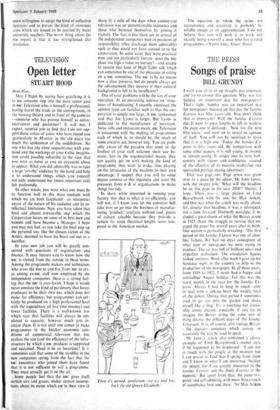Open letter
TELEVISION STUART HOOD
Dear Huw,
May I begin by saying how gratifying it is to see someone step into the most senior post. in BBC Television who is himself a professional, having learnt the trade in the cutting-room, in the 'viewing theatre and in front of the cameras —someone who has proved himself as editor, interviewer and performer? It will not, I expect, surprise you to find that I do not sup- port those critics of yours who have found you (particularly in Monitor in the old days) too much the spokesman of the middlebrow. No one who has any close acquaintance with your mind and the workings of your Celtic imagina- tion could possibly subscribe to the view that you- were as naïve as you on occasions chose to appear. What you did admirably was to take a large 'art-shy' audience by the hand and help it to understand things which you yourself not only understood but (more important still) felt profoundly.
In other words, you were what one must be to function well in this mass medium with which we are both fascinated: an interpreter aware of the nature of his audience and its in- tellectual limitations. Now you have taken that final and almost irrevocable step which the Corporation forces on some of its best men and women and have become a Manager. I hope you may not feel, as you take the final step up the pyramid too, like the chosen victim of the Aztecs, destined to have his heart cut out as a sacrifice.
In your new job you will be greatly con- cerned with questions of organisation and finance. It may interest you to know how the sac is viewed from the outside in these terms. Among the programme makers and technicians who cross the line to and fro, from Bac to rrv, as among ex-BBC staff now employed by the independent companies, there is a strong feel- ing that the sac is over-lavish. I hope it would never emulate the kind of parsimony that forces producers to be their own PAS, which does not make for efficiency; but programmes can cer- tainly be produced on a high professional level with the expenditure of less time (money) and fewer facilities. There is a well-known law which says that facilities will always be em- ployed to capacity, however much you in- crease them. It is not until one comes to make programmes in the bleaker economic con- ditions of commercial television that one realises the size (and the efficiency) of the infra- structure by which a sac producer is supported and sustained. Need it be so luxurious?- It is sometimes said that some of the troubles in the new companies spring from the fact that the Bac executives who joined them have found that it is not sufficient to will a programme. They must actually get it on the air.
Some people feel that the BBC gives itself certain airs and graces, makes certain assump- tions about its status which are in their view (I
share it) a relic of the days when commercial television was an unmentionable indecency and those who bettered themselves by joining it traitors. The fact is that there are in several of the independent companies men in positions of responsibility (they discharge them admirably) such as they could not have aspired to in the corporation. In some cases they were practical men and not particularly literate—does the sac place too high a value on literacy?—and unable to sustain that kind of High Table talk which can sometimes be one of the pleasures of sitting on a sac committee. The Bac is by no means now a class preserve, but do people always get the advancement they deserve if their cultural background is felt to be insufficient?
One of your problems will be the size of your operation. At an interesting seminar on 'struc- tures of broadcasting' I recently expressed the opinion (you are familiar with it) that the cor- poration is simply too large. A BBC spokesman said that Joe Lyons is larger. But Lyons is dedicated to the manufacture of ice-cream, Swiss rolls and restaurant meals; BBC Television is concerned with the making of programmes each of which is, or should be, the result of some creative act, however tiny. You are prob- ably aware of the paradox that some of the liveliest of your staff welcome sheer size be- cause, lost in .the organisational mazes, they can quietly get on with making the kind of. programme they want to make, thus playing on the intricacies of the machine to their own. advantage. I suspect that you will to some degree connive at this ingenuity and resist the pressures from o & M organisations to make things too tidy.
In short, while interested in running your factory (for that is what it is) efficiently, you will not, if I know you, let the conveyor belt take over or go into the business of manufac- turing 'product,' artefacts without soul, pieces of culture saleable because they provide a vehicle for some theatrical knight, series tem- pered to the American market.
'Then it's agreed, gentlemen—we try and buy back the old Queen Elizabeth.'
-The equation in which the terms are accountancy and creativity is probably in- soluble except as an approximation. 1 do not believe that you will wish it to work out exactly being yourself a man. who has created programmes.—Yours ever, Stuart Hood.


































 Previous page
Previous page